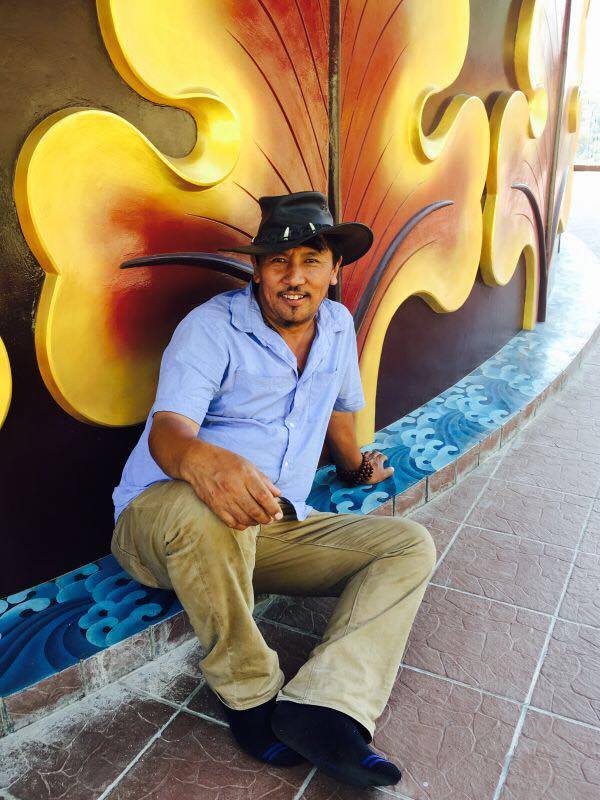Apo Thuka and Apo Serka guided us to India when my cousin and I escaped from Tibet in 1995 when we were eight and ten years old. As we grew up in India, I got to know Apo Thuka and he told me his story.
I came to know that his real name is Thupten Woeser and Apo Thuka is a short name used by his family and near ones. He was born in Derge Lingtsang in Kham, in south eastern Tibet. He first escaped to India in July 1991 with his whole family. “It was during the 1987 Tibetan uprising against the Chinese régime in Lhasa,” he told me, “I was helping a wounded Tibetan who got shot on that day, later I found that the Chinese had caught me helping that man on camera and they were looking for me. So I fled to Amdo [in north eastern Tibet] for few years and later to India realising that it is not safe anymore to stay in Tibet”.
In 1993 he went back to Tibet as he found life in India difficult, being a refugee without a proper job and a family to support. He thought he would do some business but he was not so lucky with that so he once again escaped to India. That was the first time he tried being a guide helping Tibetans to escape fromTibet. “There are many Tibetans who want to go to India but they don’t know the route, so I thought maybe I can guide them to Nepal and earn some money since I know the safe route out of Tibet” he said.
He has been going back and forth for awhile since then. It was in 1995 when he was in Lhasa that he came to know that the Chinese police were looking for him because he had guided four Tibetan political prisoners, two monks and two nuns, to India on his previous journey. So he immediately left the city and went back to his hometown to hide.
I still remember seeing him for the first time. He was a big man with a well-built body and he has the look of a fierce Khampa man. He told my parents, who had come to see us off, not to worry as he would look after me carefully and let them know once we reach safety in Nepal.
Apo Thuka’s groups always left Lhasa secretly, telling everyone they met on the way that they were going for a pilgrimage to Shigatse, the second largest city in Tibet and the seat of His Holiness the Panchen Lama. They were always prepared with things needed for someone going for a pilgrimage, including butter lamps, stored at the back of their truck. After two days of driving, they abandoned the truck at Dingri to start their journey on foot, and then crossing the border over the Himalayas. “It is a very dangerous job, if you are caught by the Chinese, you will be put in prison for 18 years or more” he told me.
The road is dangerous and difficult and they always had to be very careful. They usually travelled at night to avoid border patrols and would rest during the day. “The hardest part of the journey is crossing the glacier of Shar Gangla[the Nangpa la] pass. Many children get frostbite and snow blindness and some even may fall into deep ice crevasses, but luckily that sort of things never happened to any of my group members”.
The worst part of the journey after crossing the border into Nepal is being captured by the Nepalese police, they did not hand the Tibetans overto the Chinese police in those days, but they did steal everything from you: money, extra clothes, watches and torches, and even the little food that you had, and then drop you back at the border. Our group was caught and dropped back at the border four times before we could successfully avoid capture and make it into Nepal. The fourth time, we had finished all our food and we went to beg from the nearby houses where they offered us some potatoes and rice balls which we made into a delicious rice porridge.
Apo Thuka has successfully guided many Tibetans into exile, it was a job requiring dedication and hard work and he always did it with compassion and made a point of always being truthful. Even though these guides have no good image or reputation in Tibetan society, he is happy with what he did and says that it always gives him a sense of satisfaction. “Now when I look back I think I have done a pretty good job, the kids that I have brought here have now finished their studies and are working in Central Tibetan Administration offices, the monks have already got their Geshe Degrees [equivalent to a Doctorate in Tibetan Buddhist philosophy], so I am happy” he said with a smile.
Now Apo Thuka works at the Tibetan Medical and Astrological Centre as a helper in the pharmaceutical department and is leading a happy life with hisfamily. I still visit him sometimes and we always enjoy talking about the memories of our journey towards freedom.





 Print
Print Email
Email













